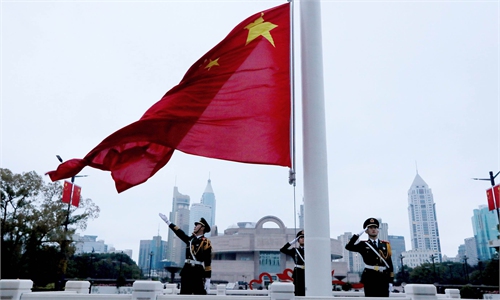China's top legislature emphasizes correction of normative documents for legal consistency

Photo: VCG
The Legislative Affairs Commission of the National People's Congress (NPC) Standing Committee, China's top legislature, has stated certain provisions in regional regulations, including the complete ban on fireworks and firecrackers, as well as the collective punishment of close relatives of criminals, to be illegal or inconsistent with the nation's constitution. Local authorities are required to rectify these regulations accordingly.
Shen Chunyao, director of the Legislative Affairs Commission of the NPC Standing Committee, presented on Tuesday a report on Tuesday to outline the review on the validity of sub-statutory legislation filed with the NPC Standing Committee for recording.
The report indicates that certain local laws and regulations comprehensively prohibit the sale and use of fireworks and firecrackers. Some citizens and businesses have submitted review suggestions regarding the complete ban provision.
After review, the commission believes neither China's laws such as China's Air Pollution Prevention and Control Law and the regulations on the safety management of fireworks and firecrackers, nor the administrative regulations on the sale and use of qualified fireworks and firecrackers have stipulations on a thorough ban on fireworks or firecrackers.
Besides, the local people's governments at or above the county level are authorized to specify the time periods and areas for restricting or prohibiting the use of fireworks and firecrackers.
The local laws and regulations on the thorough ban of fireworks and firecrackers are inconsistent with the relevant provisions of national laws and regulations, which should be rectified in accordance with the spirit of the higher-level laws and regulations, the commission said.
After communication, the relevant authorities have agreed to promptly make amendments to the relevant provisions, according to Shen.
According to Nanfang Metropolis Daily, the ban on fireworks and firecrackers dates back to 1988 but a consensus was not reached only until 2015 when some local governments successively rolled out their prohibition on fireworks and firecrackers.
Zhengzhou, in Central China's Henan Province, thoroughly prohibited fireworks and firecrackers in the whole city starting from January 1, 2016 while the entire province banned the fireworks and firecrackers since July 30, 2021.
However, multiple places adjusted and loosened the policy of "complete ban on the use and sale of fireworks and firecrackers" in early 2023. Provinces including South China's Guangdong, East China's Shandong and Northeast China's Liaoning changed the ban into a restriction on fireworks and firecrackers, specifying that the public can use fireworks within specific time periods and designated areas and guiding people to use fireworks and firecrackers scientifically and moderately through detailed regulations.
China has intensified its oversight of regulations and legal interpretations this year to ensure alignment with the Constitution and respond to public concerns about improper legal provisions.
The report presented by Shen to the Standing Committee of NPC outlined the ramped-up efforts. Since the beginning of 2023, the General Office of the NPC Standing Committee has received and reviewed 1,319 normative documents, including 24 administrative regulations and 10 judicial interpretations, from various government departments.
In the report, the commission also proposed that the practice of punishing close relatives of the individuals involved in a crime is unconstitutional.
According to the report, some places issued notifications to implement punitive measures against the spouses, children, parents and other close relatives of the individuals identified as the key figures involved in the crimes in terms of their rights of education, employment and social security.
Some citizens have submitted review suggestions, contending that such restrictive measures effectively amount to a form of "collective punishment," which should be stopped.
China's constitution stipulates that Chinese citizens shall enjoy the rights granted by the constitution and laws and fulfill the obligations specified by the constitution and laws. The commission decided that the legal responsibility for any illegal and criminal actions should be borne solely by the perpetrator of the illegal and criminal acts and should not extend to or involve others, which is a fundamental principle of the modern rule of law.
Such notifications which impose restrictions on various rights of close relatives of individuals involved in crimes, go against the principle of individual responsibility for crimes, the commission said, noting it is inconsistent with constitutional principles and spirit, and inconsistent with the nations' principles and spirit of relevant laws and regulations on education, employment and social security.
The Legislative Affairs Commission, together with relevant supervisory authorities, will urge the relevant departments to repeal the notifications, and support relevant supervisory authorities nationwide in conducting self-examinations and self-corrections to prevent and avoid similar situations, ensuring that law enforcement and judicial work progresses in a standardized manner on the track of the rule of law.
Global Times


